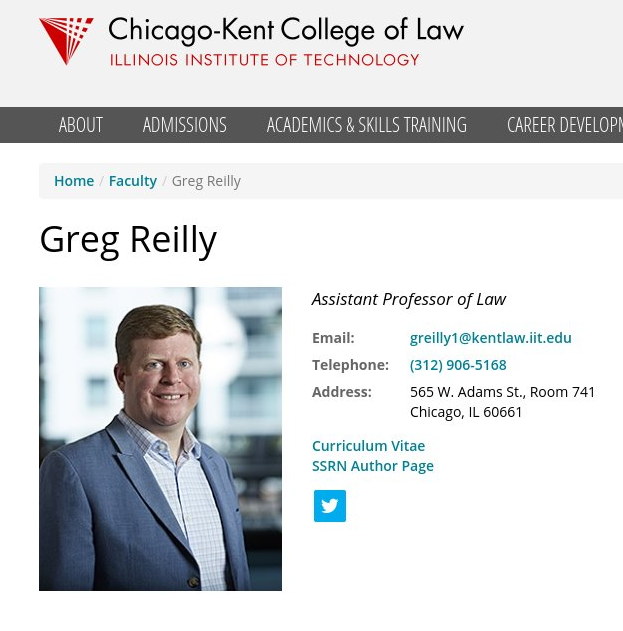
Reference: Greg Reilly
Summary: Editable patents make a lot more sense in the age of the Internet and the World Wide Web; companies that rode the wave of the Net are themselves changing their patents on the go, sometimes because they simply attempt to dodge an evolving patenting criterion which nowadays looks down on software patents
IT SHOULD not be so surprising that some
EPO and
USPTO insiders, examiners included, know the limits of their occupation and the downsides of what they do, e.g. passing 'weapons' to patent trolls that create nothing but extract millions if not
billions of dollars from those who do. Some even told us that, in their view, something like a Wiki in this Internet era (literature in the old sense of the word is dying) would be more suitable for supporting progress or "innovation" (that latter term is favoured among patent merchants).
Posted on Sunday (7
th of October, 2018) was
this new paper from Greg Reilly (IIT Chicago-Kent College of Law). Trying to make patents non-static, realising that many US patent claims are bunk and the patents themselves fake (as affirmed later by courts), is nothing new. It's already done to a certain extent in several patent offices, with edits made before and after granting, sometimes after Patent Trial and Appeal Board (PTAB) inter partes reviews (IPRs).
The abstract says:
"Patent claims traditionally have been freely amendable to overcome a finding of unpatentability. For that reason, the Patent Office’s restrictive approach to amendments in new post-issuance review proceedings created by the America Invents Act provoked strident criticism; generated administrative, statutory, and constitutional challenges; and fractured the Federal Circuit. This Article supplies the comprehensive evaluation of the costs and benefits of patent claim amendments, both in examination and post-issuance, surprisingly missing in the literature.
"The results are mixed. Amendments in initial examination are less clearly warranted than commonly thought, with the costs – primarily problematic drafting incentives – often overlooked and the benefits often overstated given other tools to protect patentees’ legitimate claim scope. Conversely, post-issuance amendments are more justified than often thought, with competitors’ reliance interests overstated, patentees’ reliance interests understated, and strategic behavior possible on both sides. Resolving the ambiguity in the optimality of claim amendments depends on a normative view of where to place the risk of error – hindering protection and incentives for inventors when warranted amendments are denied or hindering competition and follow-on innovation when unwarranted amendments are allowed.
"This provides important policy insights. First, because claim amendments invoke the patent system’s basic trade-off between innovation and competition, they offer a promising, but underutilized, tool for Congress to adjust this balance. Second, given the ambiguity in the justifications for claim amendments, the long-standing liberality towards amendments, and the Patent Office’s historically-limited role, the Patent Office probably should not adopt an overly restrictive approach to post-issuance amendments without clearer direction from Congress, despite having the power to do so. Third, the best policy for post-issuance amendments may be a discretionary, case-by-case approach rather than a “one-size-fits-all” approach that is likely to generate significant errors."
Not too long ago a reader told us that Amazon had modified its more controversial patents. Instead of these patents being thrown out Amazon was given a chance to 'correct' these on the go, defeating the whole purpose and essence of the patent system. Should we start editing millions of patents, adding version numbers to each? Or editions (like in books)? It's absurd. Maybe one should accept that the way things are currently being done is rather antiquated; it's suitable for the age of libraries, a residue of an era when
literal transportation of books was the means of "technology transfers".
Speaking of Amazon, recall its
record on patents; the company is about surveillance and delivery rather than manufacturing (it doesn't really produce anything itself). Amazon captures data, worldwide, for the security state to process (AWS). Alexa/Echo etc. (with the Amazon logo added to them) are listening devices connected to Amazon's back end (like AWS) for processing. All the manufacturing is left for China to do (merchandising is Amazon's core business) while Amazon staff is treated as worse than slaves. We previously gave examples of Amazon's patents on oppressing its workers (putting them in cages, shackling them with surveillance wristbands etc.) and the latest creepy Amazon patent is
this from the news:
If Amazon follows through on a pair of patent applications, future fulfillment centers could be transported on their rounds by trains, ships or trucks and deliver their goods with autonomous drones flying out from the tops of shipping containers.
The on-demand system for package delivery is covered in two applications that were filed a year and a half ago but published just today. The inventors are principal software engineer Brian Beckman and intermodal program manager Nicholas Bjone.
Other patents on Orwellian fiction [
1,
2] now include "autonomous police car patent," to quote the former, with the latter being titled
"Walmart Patent Wants To Monitor Your Health & Stress Levels While You Shop" (associating patents more and more with oppression).
Things need to change in order to improve the public image of patent offices and patents in general.
⬆

